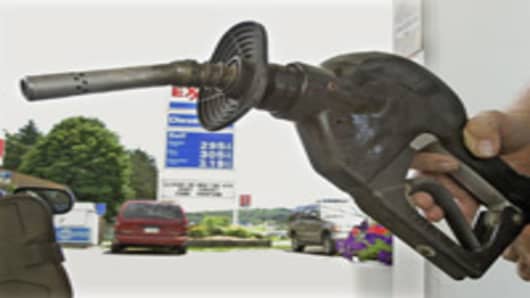Gasoline prices are heading lower. Enjoy it while it lasts, but don't expect the decline to provide a huge jolt to consumer spending.
It's an interesting paradox: Gas prices tend to deal a hard blow to consumer spending as they rise, but lower prices provide little benefit to spending as they fall.
When gas prices go over $3.00, it begins to cause some "psychological damage" in the mind of the consumer, said Tom Kloza, publisher and chief oil analyst at Oil Price Information Service. "When prices go over $3.25, it begins to cause some real damage."
But when prices fall, most consumers don't experience the same emotional reaction. And most people don't actually drive enough for the savings from lower gasoline prices to make a substantial difference.
Right now, the national average pump price has fallen to $2.793 per gallon, according to AAA, Wright Express and Oil Price Information Service. That's down nearly 14 cents from the May 6 price of $2.93.
Some consumers may be already seeing prices that are much lower than the average—perhaps as low as $2.50 per gallon in some areas. And this is only the beginning of the downward slide based on trends in crude oil prices, which have fallen more than 20 percent this month, though without much benefit so far to consumers at the gas station.
The timing couldn't be any better. Consumers are getting ready to hit the road for the Memorial Day holiday.
Kloza expects that gasoline prices this summer will average about the same as they did last year. If this proves to be true, that means prices at the pump will average somewhere between $2.70 and $2.60 a gallon.
That would be a much better than the scenario some were envisioning a few months ago. At that time, many analysts were predicting that gasoline would average above $3.00 a gallon.
According to research conducted by the BeemerReport.com, nearly three out of five American consumers—some 57.7 percent—said they would have to cut back on discretionary spending as soon as gas prices reach $3.00 a gallon.
Those surveyed said they would cut back on spending at retail stores, restaurants, movie theaters and travel.
But consumers are still very reserved in their spending in these areas already, said Todd Hale, senior vice president of Consumer and Shopper Insights at Nielsen. Although Hale admits there has been some rebounding in retail spending, consumers are still eating out less, doing more activities at home, hunting for coupons and combining shopping trips.
"Consumer confidence remains at low levels in the U.S.," Hale said.
But there are some signs of improvement, and falling gas prices can certainly help the mood.
The latest read on consumer confidence from the Conference Board showed improvement for the third straight month, and a report out Monday from the U.S. Transportation Department showed that U.S. highway travel rose for the first time this year, rising 2.3 percent in March compared with the year-ago period.
But even with that increase, total highway travel is down 0.7 percent from the same period last year.
Also important: Consider the reason for the slide in gasoline prices. Crude oil priceslogged their decline on fear that the U.S. is about to import a second recession from overseas, said Shawkat Hammoudeh, a professor of economics and an expert in oil economics at Drexel University's LeBow College of Business.
The concerns about the "echo recession"—one sparked by Europe's debt crisis—will likely weigh on consumer sentiment as well, especially if stocks continue to falter as well.
It's important to note that the latest read on consumer confidence does not reflect the latest losses in the stock market as the cutoff date for the Conference Board's research was May 18. But it is likely that consumers are paying attention and being watchful about how things are unfolding, especially after being impacted by the U.S. financial crisis in 2008.
As Hale notes, the financial crisis had a much bigger impact on consumer spending then did the $4 a gallon gasoline prices during the summer of 2008.
More from Consumer Nation:
- Americans Are Vacation-Bound, but Bargain Conscious
- Post-Recession Consumer Is a Tougher Sell
- Consumers to Stick With Private-Label as Economy Improves
- Luxury Four Seasons Hotel to Expand in China
Questions? Comments? Email us at consumernation@cnbc.com



